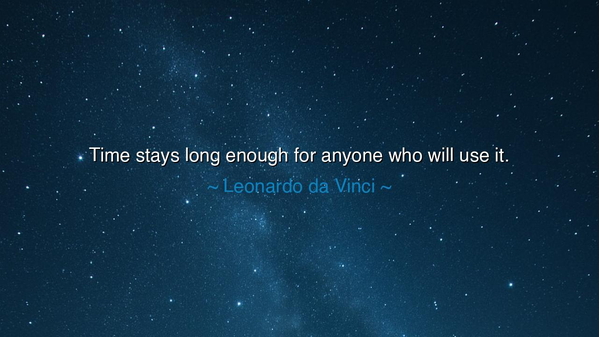
Time stays long enough for anyone who will use it.






Leonardo da Vinci, master of art, science, and invention, once said with timeless clarity: “Time stays long enough for anyone who will use it.” In this simple phrase lies a truth that resounds across the ages: time, though fleeting, is sufficient for those who grasp it with purpose. Men often cry that life is too short, that hours escape like sand through their fingers. Yet Leonardo reminds us that the measure is not in the length of years, but in the use of them. For those who labor with intent, who live with focus and devotion, time becomes abundant, stretching long enough to fulfill their destiny.
The origin of this wisdom springs from Leonardo’s own life, a man whose genius spanned painting, anatomy, engineering, and philosophy. Though he left many works unfinished, he embodied the principle of embracing the hours fully. With quill in hand or brush on canvas, he sought to use time as a servant of curiosity and creation. In observing him, we see that his greatness was not born of endless years, but of the relentless desire to use the years he was given. His words thus become both confession and counsel: time is enough—if you live it well.
History shows us examples of this truth lived out. Consider Alexander the Great, who, though dead by the age of thirty-two, had conquered much of the known world. His life was not long, but his use of time was fierce, decisive, and relentless. To this day, his name endures, proving that length of years is less important than what one sows within them. Time stayed “long enough” for him, because he seized it with purpose.
Likewise, the story of Florence Nightingale shines as another testament. In the Crimean War, she worked tirelessly amidst disease and suffering, transforming military hospitals and laying the foundations of modern nursing. Her nights were short, her days exhausting, but she used time with such devotion that even the briefest hours became filled with meaning. For her, each moment was not wasted in lament, but consecrated in service. And thus, time became abundant, because she lived it with intent.
The deeper meaning of Leonardo’s words is that time bends itself to the will of the purposeful. To the idle, it is always too short; to the distracted, it is always too fleeting. But to those who live with focus, discipline, and vision, it is always just enough. For time, like a river, may not be stopped, but it can be harnessed. The one who builds his life with direction finds that the river carries him where he must go.
The lesson for us is this: stop lamenting the shortness of life and begin using it with intent. Do not waste hours in idleness or bury your days in trivial pursuits. Instead, choose a path of purpose, whether in learning, creating, serving, or loving. For in the act of using time, you discover that you already have enough. Time, like a faithful companion, lingers long enough for those who walk with it deliberately.
Practically, this means living with awareness and discipline. Begin each day with intent; ask yourself what matters most, and give your hours to it. Avoid the thief of distraction. Use even small fragments of time wisely, for a moment of reading, a word of kindness, or a step of progress is never wasted. Let your days be filled not with regret of what could have been, but with the satisfaction of what was done.
So remember, children of tomorrow: time stays long enough for anyone who will use it. Do not curse its brevity, but bless its abundance when held with purpose. The secret is not in gaining more years, but in mastering the ones already given. Live each day as Leonardo did—with curiosity, with discipline, with passion—and you too shall find that time, though fleeting, will be enough to leave behind a legacy that endures beyond the hours of your life.






AAdministratorAdministrator
Welcome, honored guests. Please leave a comment, we will respond soon